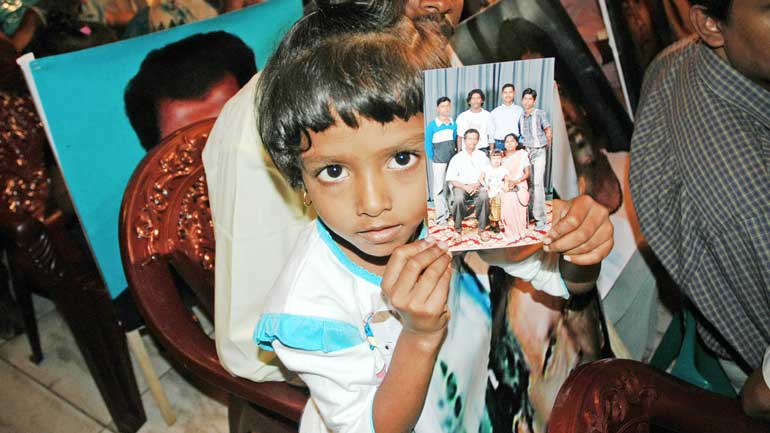Monday Feb 23, 2026
Monday Feb 23, 2026
Saturday, 27 August 2016 00:00 - - {{hitsCtrl.values.hits}}
 A large number of persons participated in the public meetings, particularly families of the disappeared, demonstrating a desire to be heard in the hope and expectation that this initiative may deliver despite the expressed lack of trust – Pic courtesy Amantha Perera/IRIN)
A large number of persons participated in the public meetings, particularly families of the disappeared, demonstrating a desire to be heard in the hope and expectation that this initiative may deliver despite the expressed lack of trust – Pic courtesy Amantha Perera/IRIN)
The Consultation Task Force (CTF) in a statement said it welcomes the passage of the Act to establish the Office of Missing Persons (OMP) as it creates a historic opportunity to address a long-standing problem and provide multiple services to a long neglected group of victims.
This is a promising beginning to a necessary process of providing redress, justice and accountability, truth and reparations, and will serve as a building block for the transition towards a more democratic, just, equitable and peaceful Sri Lanka.
The CTF recognises the significance of the decision by the Government to ascertain public views on the Reconciliation Mechanisms it has proposed. The CTF however notes the lack of information about the proposed mechanisms, the lack of awareness about the consultation process and the persistence of fear in parts of the country of speaking out—all of which, hinder this process.
The island-wide consultations are currently on going. However, as a result of the Government’s decision to expedite the passage of the OMP Bill, the CTF released two reports based on submissions made to the consultation process, “Summary of Submissions Received on the Disappeared and the Office of Missing persons” (May 9th 2016) and “The Office on Missing Persons Bill and Issues concerning the Missing, the Disappeared and the Surrendered.” (Referred to as the Interim Report).
Following the CTF’s Summary document and two meetings convened by the Government with civil society organisations and affected families, the Government took on board suggestions to improve the Bill. Notwithstanding this, the CTF is disappointed that key recommendations of the affected families in the Interim Report including on the title, composition and powers of the Office were not included in the Bill.
During consultations, families of the disappeared in general welcomed the establishment of the OMP. However, they had reservations about it, including providing answers regarding the fate of their loved ones. As the CTF’s Interim Report notes of the consultation process, it is “… viewed as the most recent in a series of processes and structures that they have engaged in and found nothing but false hope. Indeed, it is difficult to fully convey the determination, exhaustion and desperation expressed by family members who have attempted to seek redress from multiple actors, including successive commissions.”
The lack of information and awareness about the process by which the Office was established, its role and functions has contributed to the fear and suspicion, including amongst the families of the Missing in Action (MIA), that the OMP will exclude them. Therefore whilst the Government’s commitment to expedite the establishment of these mechanisms is appreciated, the lack of information, awareness and attention to incorporating public views, particularly of those families affected by disappearances, reveals a troubling lack of sensitivity to the widespread nature of the crime of disappearances in Sri Lanka, the manner in which it continues to haunt families across the country, and the failure on the part of the State to address its horrific complicity in this crime over several decades.
The consultation process received a significant numbers of submissions—written and oral—on the issue. On the basis of these submissions, a number of recommendations were made in the CTF’s Interim Report.
Recommendations relating to the Act include but are not limited to the following:
The submissions received on the issue of missing and disappearance also referenced issues beyond the OMP Act and provided multiple recommendations in the three following areas. Some of these recommendations are:
a) Operationalisation of the OMP
b) Certificate of Absence
A large number of persons participated in the public meetings, particularly families of the disappeared, demonstrating a desire to be heard in the hope and expectation that this initiative may deliver despite the expressed lack of trust. Inclusion of their views could serve the vital purpose of building trust, restoring confidence in the State and creating a sense of public ownership.
It is imperative therefore that the views of the public be incorporated in the design and establishment of all the reconciliation mechanisms proposed by the Government. This historic opportunity that the Government has provided for the affected communities to be heard must not be lost.